Envisioning a sci-fi future with Latinx people at the forefront with Mañana
Mañana: Latine Comics From the 25th Century gives Latinx creators a chance to create their own sci-fi stories
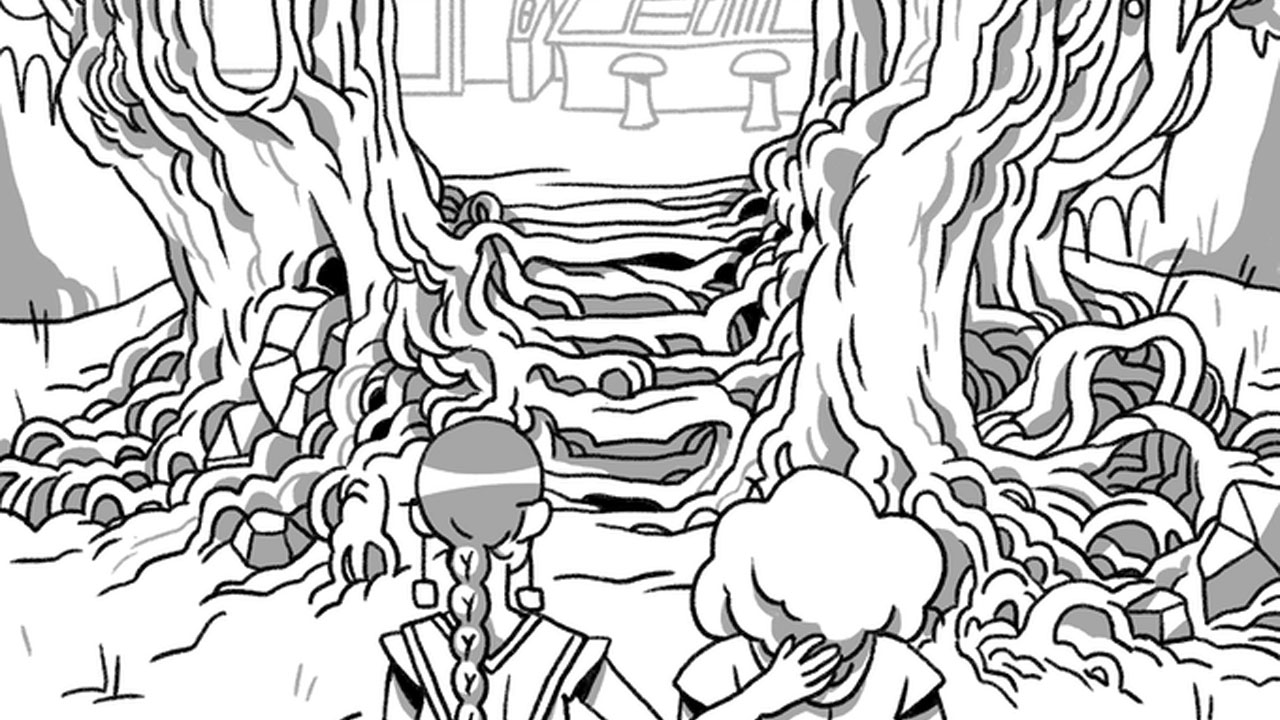
Crowdfunding has dramatically changed the comics landscape in recent years, and Power & Magic Press publisher Joamette Gil is using the publishing medium to give 50 Latinx creators the chance to explore how the Latin American landscape may change in the many, many, many years to come.

Mañana: Latine Comics From the 25th Century is the first science fiction anthology from Power & Magic Press, and features 27 stories from Latinx creators exploring potential Latin American futures more than 500 years in the future.
The anthology launched on Kickstarter July 21 and reached its initial $49,000 goal in two weeks. Since then, the anthology has soared to more than $59,000, unlocking a digital Spanish language translation of the anthology.
For Gil, Kickstarter has been essential to Power & Magic Press. She cites crowdfunding powerhouse C. Spike Trotman (Iron Circus Comics) as an inspiration, noting, "Without exaggeration, I could not be a publisher without Kickstarter. Power & Magic Press was founded on enthusiasm, trial and error, and absolutely zero dollars. I hadn't lived the sort of life where I could apply for a business loan and actually qualify, nor the sort of life where any money existed for me to save up over time. The Kickstarter platform is that life-changing."
Mañana is Gil's fifth Kickstarter project through Power & Magic Press, joining more supernatural and fantasy-oriented anthology projects like two Power & Magic: The Queer Witch Anthology volumes Immortal Souls and Heartwood: Non-binary Tales of Sylvan Fantasy. Science fiction is a new direction for the press, but Gil has been at work on the project for more than a year, and has built a strong reputation amongst creators with Power & Magic's work that drew many creators to the anthology to begin with.
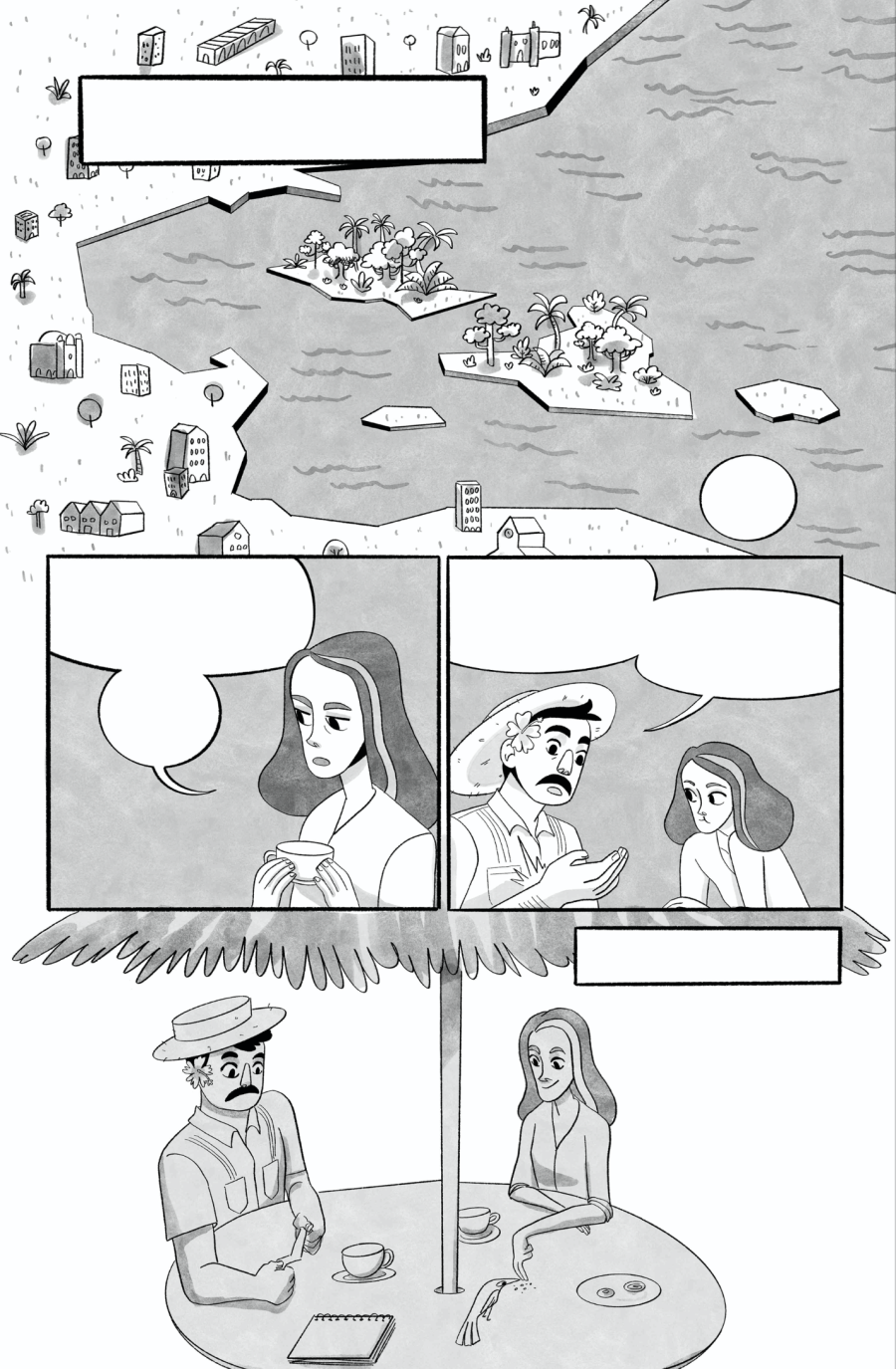
"First of all, Joamette Gil was running the show, so I knew it was going to be an amazing collection of stories because Jo doesn't mess around," says Tristan J. Tarwater, author of Mañana entry 'Bats and Fish' with illustrator Molly Mendoza. "I've known Jo from the Portland comics scene, we've been on panels together about Latinidad and whatnot, and I have a lot of respect for Jo and what she is doing with Power & Magic Press."
Gil was inspired to develop Mañana after participating in panels hosted by ¿Cómo Se Dice Nerd? at Geek Girl Con, in response to wishes for more Latinx representation specifically in the science fiction genre. The core concept of Mañana is a reflection of the histories not just of Latin America but of the Americas more generally, from colonialism through to the current political situation in the United States and abroad - a situation marked by the 1492 departure of Christopher Columbus from Spain for the Americas, which serves as a touchstone for Mañana's forward-looking timeline.
Comic deals, prizes and latest news
Get the best comic news, insights, opinions, analysis and more!
"That's how the 2490s became the time period centered in Mañana," says Gil. "It represents a forward leap equivalent in scope and transformative potential to the half-millennium that got us here, to a point where even imagining that we have a future is revolutionary."
The futures envisioned in Mañana are revolutionary, and as broad and transformative in scope as the long timeline promises. There are high-tech futures and magically-tinted slices of life, utopias, apocalypses, and the myriad possibilities between the extremes our minds often pine for or fear when considering what lies beyond the end of our own lives and into those of our grandchildren, and theirs, and their grandchildren too.
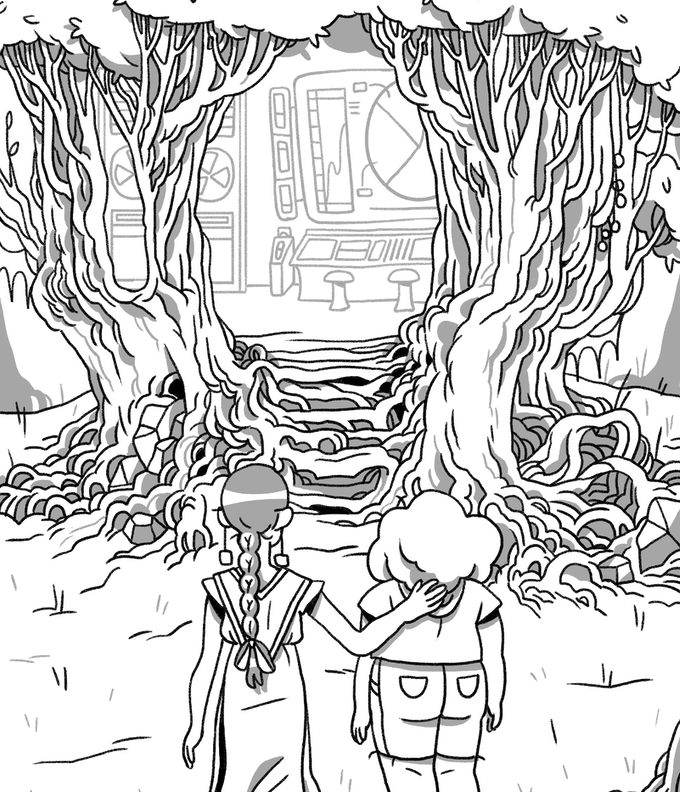
Dr. Malka Older, author of the sci-fi political thriller Centenal Cycle trilogy and artist Gabriela Palomo were paired together after responding to the initial May 2019 call for submissions and together explore a far-future detective story.
As Older asks, "What would a detective look like in such a faraway society? What kind of things would be valuable enough to steal and recover?"
It was also an opportunity to explore pressing issues for the modern-day, as well.
"I wanted to write about a future in which humans are paying a lot of attention to the environment and our relationship with it, since if we don't start doing that it's unlikely that we'll make it five hundred years into the future."
The environmental aspect featured into Palmero's art, as well, representing an opportunity to explore the varied climates and wildlife of Latin America throughout.
"One thing I really like about Latin America is the way nature is all over the place, so I tried to incorporate that as much as I could, playing with different foliage around the background elements."

For both, as for many of the creators involved with the project, Mañana represents an opportunity to bring stories of Latinx culture to a broader audience, and offer a broader array of Latinx-centered genre stories for Latinx readers.
"Mañana is an incredibly important book as it dares to not only feature but actually spotlight Latinxs in a positive way in science fiction stories and in the future no less," said Andrea Rosales, illustrator of 'Emisaria' for Mañana with a script by Terry Blas.
"Latinxs have always been starved for positive representation and it's always been absurd to me that in the far off starry future there's no Latinxs anywhere. It's baffling. Latinxs are underrepresented in film and television, in the publishing industry too (there are more children's books about anthropomorphic animals than Latinxs)."
Rosales referred to data on books by and about people of color and from First/Native Nations published for children and teens compiled by the Cooperative Children's Book Center, School of Education, University of Wisconsin-Madison. The 2018 data for diversity in books showed only 5% of books featured Latinx characters, while 27% of books featured animal protagonists - more than the number of books featuring children of color combined (5% Latinx, 10% African American, 7% Asian Pacific Islanders and Asian Americans, and 1% American Indian/First Nations). 50% of protagonists in the books compiled for the study were white.
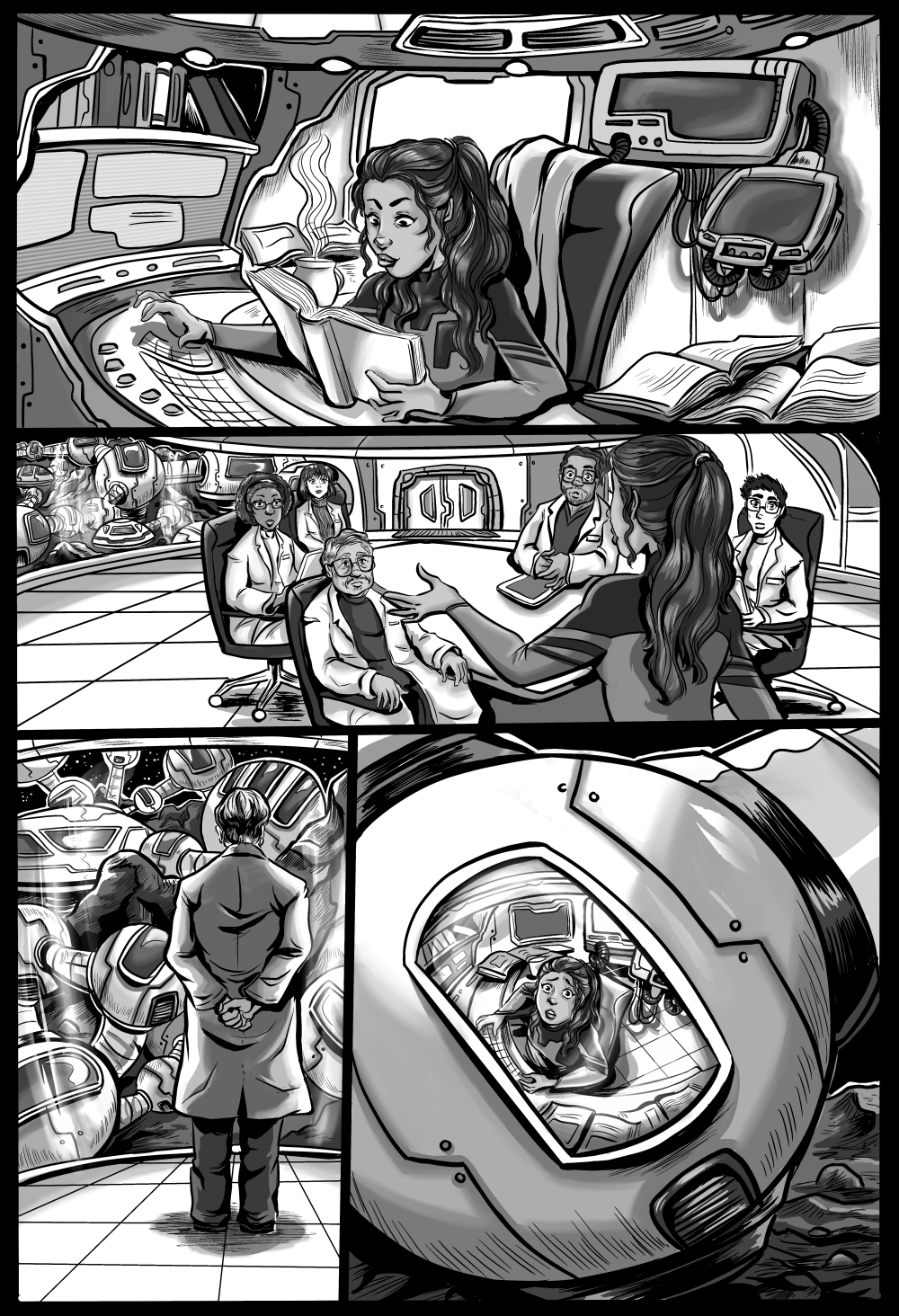
Rosales' 'Emisaria' partner Terry Blas expressed a similar sentiment about the vital need for sprawling, Latinx-centered projects like Mañana.
"This anthology is a no-brainer in my mind. I'm so glad it exists. And by that, I mean that I am fully done with stories about the United States that take place in the future and feature absolutely no Latinx people whatsoever."
Blas added, "We are the largest ethnic minority group in the country and the fastest-growing. In the next 10 to 15 years we will be a quarter of this country. It's like writers and creatives when they picture the future simply think the Latinx community is all dead. I don't accept that anymore. So books like this are not only necessary, they're born out of logic and instinct, and that's great considering its science fiction."
Publisher Joamette Gil echoed Blas' sentiments when asked what she's most excited for readers to experience when Mañana lands in readers' hands in 2021.
"I'm most excited for readers to see Latine characters in audaciously empowered positions!"
Ultimately, Mañana is an exploration of Latinx futures shaped by the reality of modern Latinx experiences and the long history of Latinx cultures through the centuries -- their own, and the cultures introduced to or imposed on them through the ages. Many stories keep an eye on the past, as well, Gil notes.
"There's one story where the premise is that native Andean culture rises to the level of galactic hegemony and must look at its own contradictions and excesses to move beyond the 25th-century problems that come with literally farming suns for energy. Not to be too punny, but that's some galaxy brain stuff! It's profoundly humanizing in its assertion that our peoples contain multitudes of genius, flaws, and the ability to be whatever it is we need to be to survive."
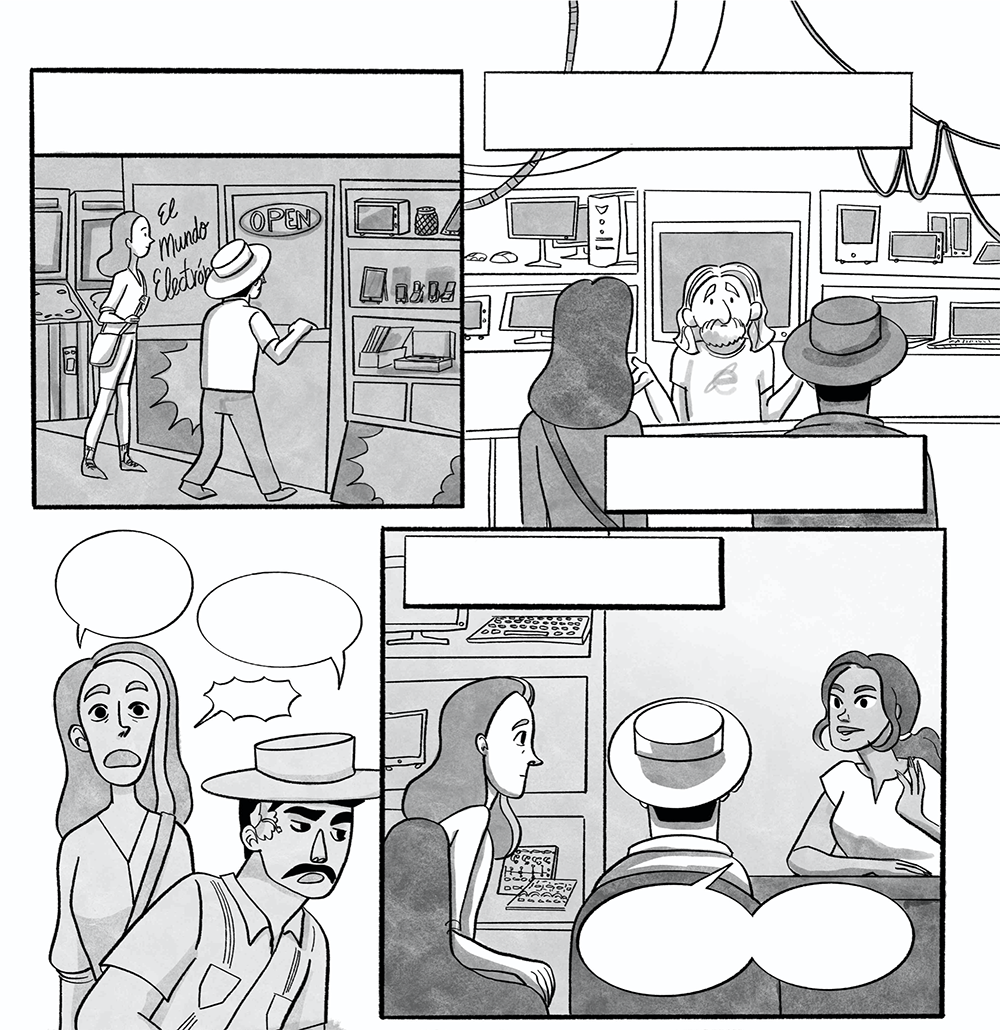
Mañana is currently fully funded and will be live on Kickstarter through August 21, 2020. Both English and Spanish versions of the book are currently available digitally, and the campaign is aiming for a number of stretch goals, including a physical Spanish edition and bonus digital comics by Anthony Otero, Yesenia Moises, Kiara Valdez, and more. Tiers begin at $15 for both the Spanish and English digital anthologies.
"I hope it hits the print version in Spanish stretch goal," Tristan Tarwater says. "It's going to increase who can access these stories and it feels good to have my story, all these stories in Spanish. As a kid, I used to watch Star Trek with my grandma sometimes and I wish she was alive to see this book, el futuro en español."
"But I am still really glad for those of us here today, who will have access to the belief that we have a future. We as individuals and a community have adapted and our culture will adapt and be a source of joy and connection wherever and whenever we go."


